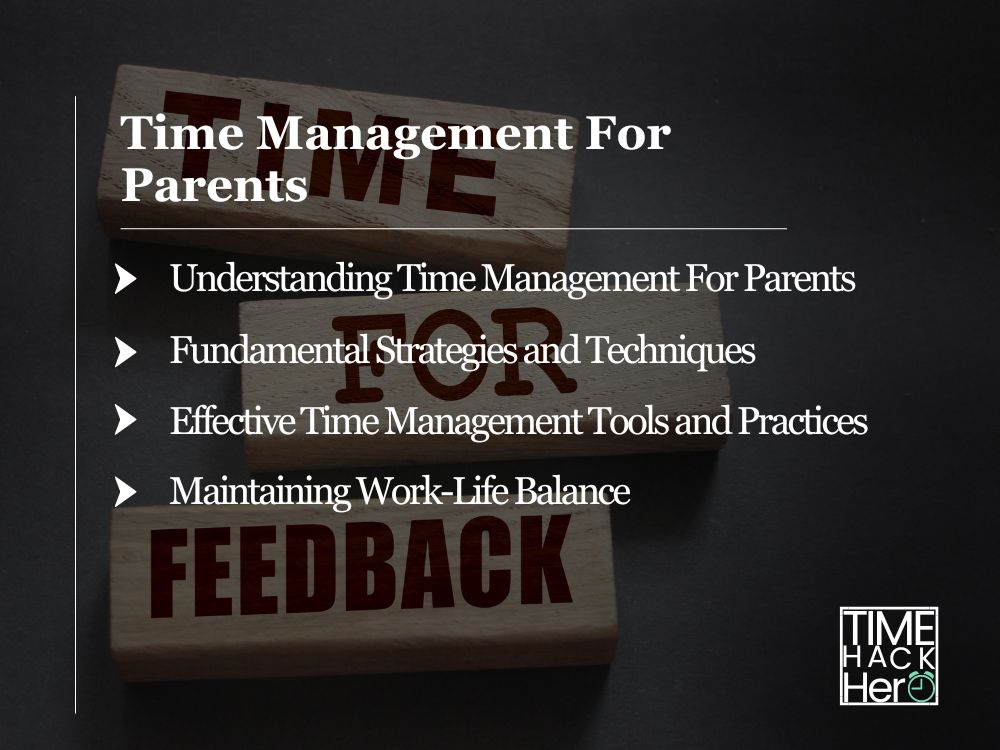Time management is an essential skill for parents in today’s fast-paced world. Juggling work, family, and personal responsibilities can often feel overwhelming, leaving parents struggling to find balance in their daily lives. Developing smart strategies to better manage time can lead to reduced stress levels and a more organized, efficient routine.
This article will explore several time management techniques specifically tailored for parents. From organizing family schedules to adopting new rituals, the tips in this article are designed to help parents find a better balance between their various responsibilities. By implementing these strategies, parents can effectively manage their time and maximize the quality moments spent with their children and family.
Table of Contents
Understanding Time Management For Parents
Challenges Faced by Working Parents
Working parents face a unique set of challenges as they try to strike a balance between their professional and personal lives. Some of the issues they encounter include:
- Work-life balance: Juggling commitments to their jobs, children, and partners can lead to stress and burnouts.
- Scheduling: Coordinating and synchronizing different tasks, such as school drop-offs and pickups, doctor’s appointments, and work meetings, can be incredibly demanding.
- Self-care and rest: Amid all these responsibilities, working parents often struggle to make time for their own needs, relaxation, and hobbies.
- Managing stress: Balancing multiple tasks and schedules can lead to an increased stress level, which may negatively impact parents’ mental and emotional wellbeing.
Importance of Time Management for Parents
Effective time management is crucial for parents in order to ensure a harmonious family life and reduce stress. Some benefits of time management for parents include:
- Prioritizing tasks: Time management helps parents efficiently allocate their resources and energy to the most important activities, such as spending quality time with their children, attending essential work-related meetings, and taking care of their own health.
- Maintaining a sense of control: Managing time effectively allows parents to feel more in control of their lives, reducing anxiety and boosting their confidence in their ability to handle various responsibilities.
- Minimizing conflicts: When all family members’ needs are considered and scheduled, conflicts over time commitments and priorities are less likely to arise.
- Improved focus: Time management allows parents to give their full attention to specific tasks, rather than constantly shifting from one activity to another. This leads to better productivity and mental clarity.
By addressing the challenges faced by working parents and recognizing the importance of time management, they can create a more balanced and fulfilling life for themselves and their families.
Fundamental Strategies and Techniques
Prioritizing and Setting Goals
To implement effective time management, parents should prioritize their tasks and set goal-based on their importance. By doing so, they will be able to focus on the most critical aspects of their life, such as spending quality family time, achieving work-life balance, and fulfilling personal necessities. One helpful method for prioritizing is creating a to-do list that ranks your daily, weekly, or monthly tasks. This approach allows you to allocate your time and energy better, ensuring that urgent and vital tasks get completed first.
Creating Routines and Schedules
Routines and schedules are essential in keeping a family organized and managing various activities. It helps you stay on track and ensures everyone knows what is expected at specific times. For example, you can establish morning routines for getting yourselves and the children ready, followed by a designated time for school drop-off and work hours. In the evenings, establish time for homework, family activities, and bedtime rituals. Using scheduling tools or apps can aid in creating routines, optimizing your time management strategies, and minimizing conflicts.
Multitasking and Organization
While multitasking can be a challenge, it can be an effective strategy for busy parents juggling various roles and responsibilities. However, it is crucial to multitask smartly, as trying to handle too many tasks concurrently can lead to diminished focus and reduced productivity. Prioritize tasks that can be done simultaneously without compromising their quality, such as checking emails while waiting for a child’s practice to finish or preparing meals while helping with homework.
Incorporating organization into your life is also a vital component of effective time management. Systematically organizing your home, workspace, and belongings can save precious time searching for items or trying to remember crucial dates and appointments—use calendars, planners, and storage solutions to maintain order and reduce clutter.
By prioritizing and setting goals, creating routines and schedules, and utilizing multitasking and organizational skills, parents can significantly enhance their time management abilities. These strategies will allow them to maintain a work-life balance and have more time for family bonding and personal well-being.
Effective Time Management Tools and Practices
Digital and Physical Tools
Working parents can benefit from a variety of digital and physical time management tools to help balance work and family life. Some popular digital tools include:
- Calendar apps: Use a digital calendar to set reminders and manage daily activities. Sync the calendar with your family members for better coordination.
- Task management apps: Organize tasks efficiently with apps like Trello or Todoist, where you can categorize tasks, assign deadlines, and collaborate with family members.
- Timers: Utilize timers on your computer or smartphone to allocate specific time slots for tasks, helping you stay on track and prevent procrastination.
In addition to digital tools, don’t overlook traditional physical tools like:
- Planners: Use planners to outline long-term goals and break them down into actionable steps.
- Wall calendars: Keep a central wall calendar for the whole family to track appointments, events, and activities.
Utilizing Shortcuts and Consolidation
One key approach to improving time management is identifying shortcuts and opportunities for consolidation. Examples include:
- Morning routines: Make a game out of getting dressed quickly with a timer or have everyone’s backpacks, coats, and shoes ready by the door.
- Bedtime routines: Read the bedtime book during bath time to streamline the evening routine.
- Shared responsibilities: Divide and conquer tasks among family members to ease the burden on working parents.
Addressing Procrastination
Procrastination might prevent you from making effective use of your time. To overcome it:
- Set realistic goals: Focus on attainable, short-term goals to avoid feeling overwhelmed.
- Break tasks into smaller parts: Divide larger tasks into manageable steps to make them less intimidating.
- Limit distractions: Reduce time spent on social media and other distractions by setting specific times for these activities.
By implementing these practices and tools, working parents can take control of their time and boost productivity.
Maintaining Work-Life Balance
Allocating Time for Self-Care and Relationships
As a working parent, it is crucial to prioritize self-care and maintain healthy relationships. To manage this, ensure that your daily routines incorporate activities that promote your well-being. Create a self-care routine, such as taking a relaxing bath, reading a book, or practicing mindfulness exercises. Ensure you allocate time for your spouse, friends, and other loved ones to nurture your relationships.
Balancing your career, family, and social life can be demanding. Try to consolidate your tasks to make the most of your time by:
- Combining errands
- Preparing meals in advance
- Streamlining work tasks
Establishing boundaries between work and family life can be an essential aspect of time management for parents. Implement strategies to separate your corporate and personal life, such as turning off email notifications outside work hours.
Delegating and Seeking Support
Nobody can manage everything single-handedly, so don’t be afraid to ask for help. Consider delegating age-appropriate chores to your children to encourage responsibility and teamwork. Split household responsibilities with your spouse or partner to lighten the load and create a more balanced household dynamic.
Turn to your support network when you need it most. This network can include friends, family members, neighbors, or even your children’s friends’ parents. Opportunities for collaboration and mutual support can include childcare arrangements, sharing school pick-up duties, or swapping babysitting services for a well-deserved date night.
Utilize resources available through your workplace, such as flexible work hours, telecommuting options, or Employee Assistance Programs, to assist with mental health and well-being management.
In summary, maintaining work-life balance for working parents involves allocating time for self-care and relationships, delegating tasks, and seeking support for a more manageable daily routine.









